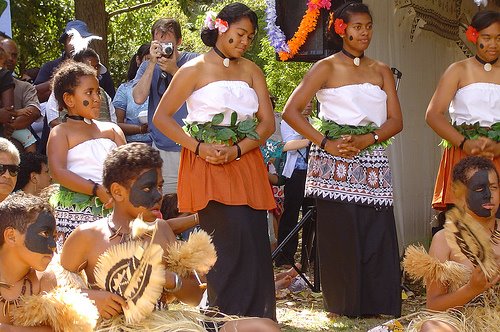 What? Turtles take 40 years to mature and lay eggs?"exclaimed a bewildered Kia islander amid giggles from the women in the classroom.
What? Turtles take 40 years to mature and lay eggs?"exclaimed a bewildered Kia islander amid giggles from the women in the classroom.Villagers and students from Kia Island in Macuata, (off the north coast of Vanua Levu) gathered at the Kia Primary School around midday on a Tuesday not too long ago to discover the biology of and threats to sea turtles Vonu.
Deeply engrossed the elders and youths participated in a debate for and against turtle protection and listened to a presentation held in Fijian by Merewalesi Laveti, of USPs Institute of Marine Resources, and Metui Tokece of WWF Fiji Programme during a turtle road show.
Beneath the shade of a mango tree, classes one to four sang with pride "Fiji has a big blue sea, full of fish and coral reefs Dont litter in the sea."
They also eagerly identified the different species of turtles in the photographs held out by WWF staff and collected their goodies upon correctly answering questions posed at them.
In a room close by classes seven and eight students argued over which turtle they had eaten some time ago or had seen nesting on their beach.
Kia Island is a known turtle nesting site and is one of the traditional fishing villages required to present turtles at traditional functions, in meeting their obligations as the traditional fishers (gonedau) for Tui Macuata.
"When the Tui Macuata summons us, we take turtles and present at traditional functions. Before there were lots of turtles and anyone could eat them,"said 69-year- old Veresi Masicola, from Ligau village, Kia. "As I grow old I notice that not as many turtles are coming to our shores. The consumption of turtles has also decreased,"added Mr Masicola.
He said, "In 1990 the villagers caught a huge Tutuwalu (leatherback turtle) almost the size of a grown man and it was taken to the Fisheries department."
"Turtles have come to our shores for decades now, however they dont come to nest in large numbers anymore. I hope in the years to come our children can still present enough turtles for magitis."
Through an evaluation process, the three tikinas visited (tikina Mali, Sasa and Macuata) expressed interest in protecting turtles and allowing the populations to recover. The evaluation also indicated that the villagers were in favour of extending the moratorium.
"We need to make sure that turtles are around for future generations,"says Savenaca Mara, turaga-ni-koro of Yaro Village, Kia. These ancient creatures travel thousands of kilometres to feed and nest in different parts of the world.
In Fiji, the four common turtles are the Hawksbill (taku), the Green turtle (vonu dina), critically endangered Leatherback turtle (vonu dakulaca / tutuwalu) and Loggerhead turtle (tuvonu).
There have been anecdotal mentions of a fifth species the Olive Ridley, but these are yet to be confirmed through research.
All species of marine turtles are in danger of extinction although at varied stages.
"Everyone who has to catch turtles for any traditional obligation needs to seek permits from Department of Fisheries,"said Kesaia Tabunakawai, WWF Fiji manager.
Between 2004-2007, 85 permits were issued for turtle harvests by the Minister of Fisheries and Forests.
"This however does not mean that people are not catching turtles it is just an indication of people who are following the law."
WWF and partners are now taking the cause of turtle protection all the way to the students and villagers starting from Macuata.
Four schools Mali District School, Bulavou District School, Cadranasiga District School and Kia District School were visited in Macuata during a four-day Turtle Road show supported by FINTEL and WWF Australia. The key outcomes of this road show are to raise awareness levels of communities on the status of turtle populations and subsequently increase compliance of the moratorium.
The road show will continue to other parts of Fiji mainly aiming the areas/villages in Viti Levu where turtles are known to nest. One of the target audience are the younger members of the communities as they are future decision makers and change makers. WWFs partner organisations such as the Department of Fisheries, Institute of Marine Resources and Laje Rotuma Initiative are combining their efforts to conduct baseline survey of nesting sites/beaches, turtle tagging, database recording and awareness.
The underlying aim is to assist the Fisheries Department to collate enough data to support the extension of the moratorium protecting turtles.
